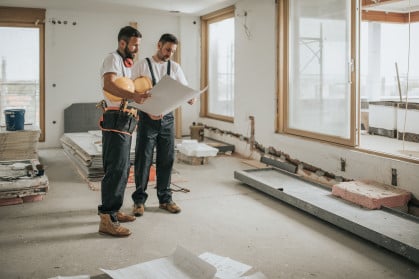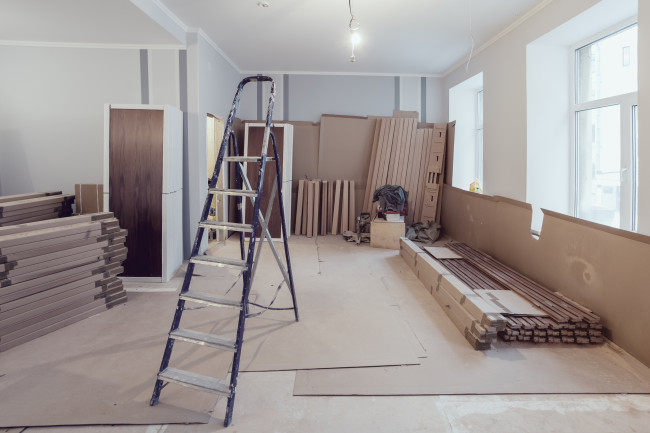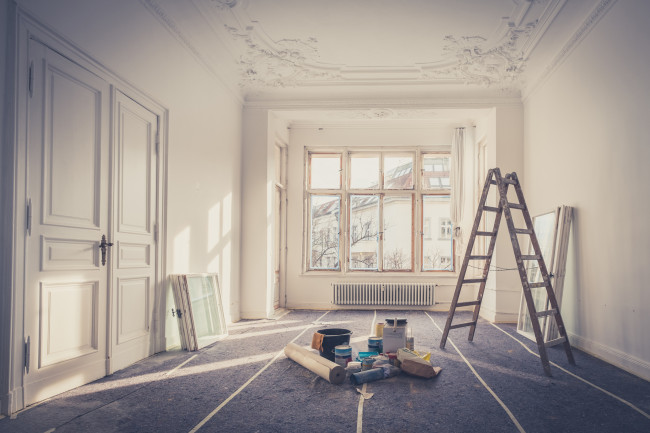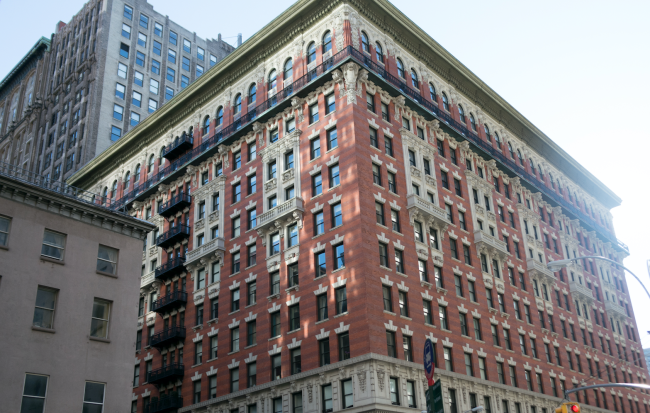- The alteration agreement defines what constitutes a breach and dictates the possible penalties
- Stopping the work can be more effective than imposing fines or withholding part of the renovation deposit
- Unauthorized work might also violate the proprietary lease and open the door for housing court claims

Regularly checking in on renovations is a good way to discover any work that isn't authorized—and then to shut the job down until you can reach a resolution
skynesher via Getty Images
As a New York City co-op or condo board member, one of your roles is approving renovations. You are also responsible for addressing any work that violates the all-important alteration agreement, including work that is unauthorized (intentionally or not) or causing damage to the building or a neighbor's unit. Projects tend to go longer than planned, too—and try the patience of you and your neighbors.
"Most renovations happen without me ever knowing about it as counsel to the building," says Rob Braverman, an attorney at Braverman Greenspun, a NYC real estate firm specializing in cooperative and condominium law. "That said, there are many ways a project can go off the rails and reported cases of projects going south." (More on such nightmares below.)
That's why it's essential to recognize that alteration agreements are non-negotiable, says Daniel Wollman, CEO of Gumley Haft, a NYC property management firm specializing in board clientele. Shareholders and unit owners must comply with the terms or else.
Conversely, the alteration agreement is the primary tool for defining and enforcing breaches, says Dean M. Roberts, a real estate attorney at Norris McLaughlin. But not all agreements are created equally. And Roberts says not every board has a formal agreement, though that's increasingly uncommon.
He says it's a two-case scenario: Is there a formal written alteration agreement executed by the parties? Or is there just an email exchange where, say, the owners request approval for putting in a kitchen sink and then end up doing a gut rehab of the entire kitchen?
How you answer that question is critical. The former will make your job all the easier in imposing fines, seeking payment for damages, or shutting down the job, though you still have recourse if the latter describes your situation.
Either way, knowing what your board can and should do when you discover anything amiss will allow you to act quickly and decisively in containing the situation and getting the project back on track.
How do you know when a violation has occurred?
It all begins and ends with the alteration agreement.
According to Roberts, a basic agreement comes in two flavors—a small one that covers things like painting and closet systems ("alteration lite") and a large one where building systems are involved ("alteration heavy"). Mainly you are concerned with the latter; in that case, the more specific the language, the better. "Without defined terms, you cannot define a breach," he says. He explains that an owner may say: "'You said I could replace the sink, and you know that meant I had to put in a whole new set of cabinets.' So a good alteration agreement makes line-drawing much easier."
It also dictates what you can and can't do in case of a breach. Roberts says most agreements provide for a two-prong enforcement mechanism: (a) the right to withhold all or a portion of the deposit made pursuant to the renovation (some as high as $100,000); and (b) the right to terminate access to the contractor and order the succession of any work. "That is a big motivator because the contractor wants to get the job done, and the shareholder or owner doesn't want to pay the contractor for standing by."
A third avenue not covered explicitly in the agreement is to bring a case in housing court—because if the alteration agreement has been breached, so has the proprietary lease. (Even if your board doesn't have an alteration agreement, most proprietary leases prevent people from doing anything involving building systems—heating, plumbing, water, and electrical—without permission.) If you prevail, it could lead to eviction.
And then you can also sue for damages in civil court if it reaches that level.
That is all theoretical. Roberts and Braverman say shutting down the project is usually sufficient—and more potent than fines, which often pale compared to the money spent on the renovation.
When can you shut down the job?
Often a project causes damage to another apartment, in which case that person will bring the matter to your attention. In other cases, the super or resident agent might discover something is amiss. Either way, Wollman says the usual process is to stop the work, inform the shareholder or unit owner, and ask the crew to leave the building. "It's our building, so if we need to stop a project, we are going to stop a project."
Case in point: During a gut renovation in a super luxury building with floor-through apartments, leveling cement dribbled down into the apartment below due to the contractor's failure to shore up the perimeter. (The cement was approved to help support the heavy floorplate in the pre-war building.) "I had to shut that costly job down for a month, and it was unpleasant, to say the least," Wollman says.
Braverman recently stopped work in a vertical combination after an alleged jackhammer went through the slab of the condo building.
Wollman rattles off other "after-the-fact" instances, including where a plumber went through the apartment ceiling below when removing the waste line and dust seeping into adjacent units because of improper protection during demolition. "I won't say it happens a lot, but these are some of the more straightforward types of things you might see and hit the pause button on," Wollman says.
And according to Braverman, the potential damage to other units is why most alteration agreements require shareholders or unit owners to notify neighbors of the renovation plans and offer them an opportunity to have a pre-construction inspection, with photos and videos showing the condition of the unit. "This way, the renovators can't claim the cracks in the wall existed before the work began."
What if the project is going past the deadline?
Jobs that go past the end date are a typical unintended problem, especially given supply chain shortages and delays. Again, you'll need to look to the alteration agreement for per diem fines that you can charge the resident. And here again, monetary penalties alone might not be sufficient motivation to cross the finish line, in which case you might want to stop the work, get to the root of the delay, and help figure out how to solve it.
For example, Roberts is dealing with an overdue renovation because the appliances are stuck on a ship; when, as here, force majeure is part of the conversation, you might consider waiving late fees since the delay is beyond anyone's control (and stopping the work wouldn't solve anything).
What if the agreement doesn't specify an end date? Braverman cited a reported case within the last year involving a renovation that (as he explained it) had been going on for years. The board eventually sued the owner to stop the work. But because the managing agent had failed to fill in the blank with the approved project timeline, the court rejected the claim and essentially held that the renovation could last in perpetuity.
Lesson learned.
What about when the work is done without approval?
Wollman says that's an entirely different problem. "We need to find out why they did what they did and then explain that they will have to undo it and return it to how it was supposed to be. And we don't care whether or not their designer likes it (a common defense)."
Suppose there is no alteration agreement, or someone tries to sneak in a renovation. In that case, based on a breach of the proprietary lease, Roberts says your board still has the right to deny access and pursue a claim in housing court plus civil court if there are damages to the building.
Lest you wonder how anyone could "sneak" in a renovation, Roberts says it is rare but happens—like the resident who installed a Jacuzzi without permission in one of his client buildings, which discovered it a year later when it had a massive failure and blew out the apartment below. ("We still never figured out how they got it in because it wouldn't fit in the elevator.")
He says the "classic unauthorized alteration" is when people put a hood in the kitchen and vent it out the airflow fan for the building—usually a big no-no. "So your option is to say either the vent goes out or you go out."
Another common scenario, per Roberts: Someone brings in an unauthorized contractor to install shelves or hang a heavy mirror, and he accidentally drills into a gas line. "Those claims get into very large numbers very fast."
Or let's say a new owner invites you and other neighbors to a housewarming party, and you notice the kitchen has been totally updated. "In theory, that's a breach that could either be cured by restoring the old kitchen or seeking damages because they did the alteration without permission," Roberts says.
How are the issues usually resolved?
By all accounts, most skirmishes reach a good end.
"If everyone is cooperating in good faith, and it was an inadvertent mistake, then there's no motivation to keep the job shut down," Braverman says.
Wollman agrees, with a caveat: "You must always concern yourself with precedents. If the contractor did something he wasn't supposed to do, I would make him undo it. I'll tell the owner I'm sorry you spent money on it, and I realize it wasn't your fault, but I have to worry about the next request. Our job is to advocate for the building in its entirety."
Still, he says he can't imagine what would ever cause a project not to restart—that has never happened.
Braverman, however, has been dealing with a renovation that has gone bad since day one. "We are having continuous dialogue with the board, the shareholder performing the alteration, and the party's respective architect and attorney. This situation is a bit unusual but shows how these things can proliferate into requiring that kind of focus and attention."
Roberts finds that most people are reasonable, "but there's always the case where the board has a burr under its saddle, or the shareholder has some issue. That's why having the formal agreement is important because it narrows the area where they can have differences of opinion."
How to prevent violations from happening in the first case
Once again, the answer lies in having a solid alteration agreement.
For starters, "It's important to have a mechanism in the agreement that lays out when enough is enough, the project has to end," Braverman says. "It's one thing when someone is having the walls painted and another when the project consists of noise-producing work such as flooring or sheetrock installation that disturbs other residents."
Wollman suggests going beyond the agreement itself. "I think you could prevent a fair number of problems by doing a thorough walk-through where you review the plans in detail and figure out what's allowed. Easy examples include rejecting requests to enlarge a bathroom because the building doesn't allow wet over dry, put speakers in the wall that abuts another apartment, or convert a primary bedroom into a children's playroom. "Some things are nuanced, and some things are clearer. But either way, you could short-circuit a bunch of stuff before the project starts."
How does he achieve that goal? He makes a point of meeting on-site with the superintendent, reviewing architect, owner's architect, and possibly the contractor and owner to go over the plans in detail (at least the construction part), review building rules and policies that might not be clearly enumerated or are unique to the particular building, and generate communication between the architects. "This might bring up items that need subsequent approval by the building."
He also meets with both architects after the demolition phase to discuss the necessary workarounds in case unanticipated issues are discovered. "We'd rather do that now than to have them build what they want to build and then say, 'well, we had to redesign around pipes that weren't discovered until the demo and didn't realize we needed to seek approval.'"
And then, he recommends having the super or resident agent check on the project daily—not to micro-manage it but to ensure it's all above board, and if not, to bring it to the attention of the reviewing architect and managing agent.
Braverman is a proponent of periodic inspections at critical junctions—and explicitly requiring all contractors to have the proper insurance and having that insurance vetted and approved by your insurance consultant. If the policies don't pass muster, this would be a basis for shutting the job down until the insurance requirements are complied with.
Keep in mind that all those Brick spoke to emphasize that most projects go off without a hitch and are, therefore, nothing to shy away from.
"Renovations are good for everybody. They increase the value of apartments and enhance the quality of life. Most New Yorkers realize that moving into a vertical environment means their neighbor might at some point conduct work that will cause noise and other disturbances," Braverman says. "And so long as it's not an unreasonable amount of noise and disturbance, people should be able to live with it."
You Might Also Like
Sign Up for our Boards & Buildings Newsletter (Coming Soon!)
Thank you for your interest in our newsletter. You have been successfully added to our mailing list and will receive it when it becomes available.























